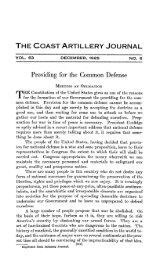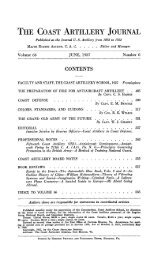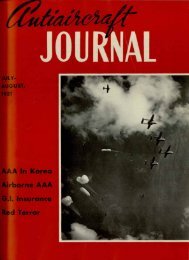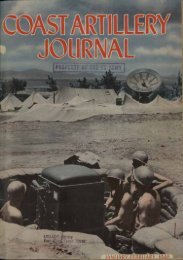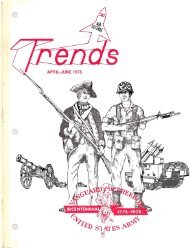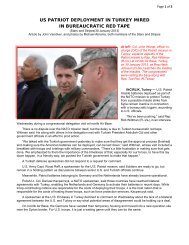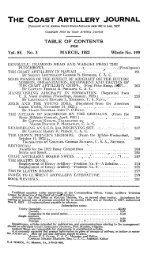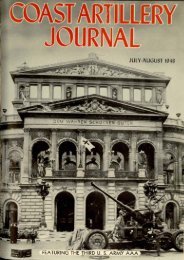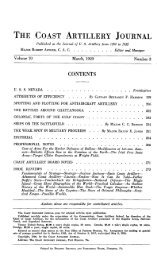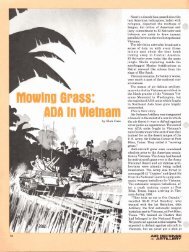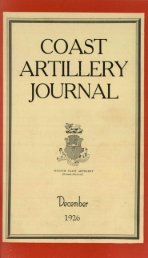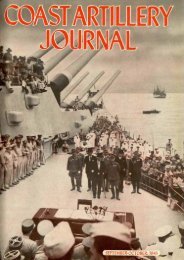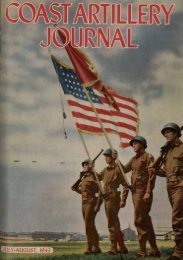COAST. I ARTILLERY JOURNAL, - Air Defense Artillery
COAST. I ARTILLERY JOURNAL, - Air Defense Artillery
COAST. I ARTILLERY JOURNAL, - Air Defense Artillery
Create successful ePaper yourself
Turn your PDF publications into a flip-book with our unique Google optimized e-Paper software.
482 THE <strong>COAST</strong> <strong>ARTILLERY</strong> <strong>JOURNAL</strong><br />
on the western frontier in the Fourth <strong>Artillery</strong> and then against the Indians<br />
in Florida. Foreseeing the War of Secession, he resigned from the United<br />
States Army and was appointed Captain in the Confederate Army. From<br />
the surrender of Sumter in 1861 to Johnston's surrender in 1865, he served<br />
with ability in every department-artillery, cavalry, infantry-in Virginia,<br />
Mississippi, Georgia, and Tennessee and was promoted on merit successively<br />
through every grade of military rank from captain to lieutenant general.<br />
At the close of the Civil War, General Lee made Columbus, Mississippi,<br />
his home. Twelve years of his life were passed here as a planter, practically<br />
and unconsciously preparing himself for his work as an industrial educator.<br />
He served as the first president of this institution from 1880 to May 1,<br />
1899. He was one of the first southerners to advocate industrial education.<br />
He believed that a student's education was not complete without a course<br />
in military science and discipline. He laid great stress upon the teaching<br />
of better methods in agriculture to Yl)ung men and the dissemination of<br />
helpful knowledge through bulletins and institutes to our farmers. He<br />
taught the need and dignity of labor, especially skilled labor. He insisted<br />
on clearness, thoroughness, and readiness or "snap," in his students and<br />
instructors.<br />
One of his successors here said of him, "The success of this college and<br />
the good it is to do in the years to come will be due, more than to anything<br />
else, to the splendid foundation work done by General Stephen D. Lee, its<br />
first President."<br />
General Lee died at Yicksburg, Mississippi, May 28, 1908, "beloved<br />
by every man, woman, and child in Dixie Land where he left the impress of<br />
his strong personality."<br />
Approved<br />
B. M. \'if ALKER,President<br />
R. E. GRINSTEAD,<br />
Lieutenant Colonel, C. S. A., Retired,<br />
Professor of Military Science and Tactics.<br />
Foreign Publications<br />
THE <strong>ARTILLERY</strong>OF THE PAST, PRESE:'irA:'iDFCTCRE.-A writer in the Militiirl/Tochenblatt<br />
of May 4, 1926, gives a brief notice of a recently published work<br />
under the foregoing title written by General Herr of the French Army which, the<br />
writer states, has been translated into German by Colonel Hirsch of the German<br />
Army.<br />
The writer congratulates the German artillery service for having this work<br />
available in translation and says that the significance of the work is such that<br />
knowledge of its contents is a service duty for the artillerist, and allusion. is<br />
again made to it in order to direct the attention of other arms of the service to it.<br />
Part I or the hook gi'ies the strength and tactics of the French and German<br />
artillery at the beginning of the war and proceeds with a continued discussion of<br />
war operations on the west front and the lessons to be derived therefrom, and<br />
the measures to he taken by the artillery in respect to increased strength, organi-<br />
zation, firing methods, and efficiency of fire. Part n treats of artillery and its use<br />
in tactical problems; the attributes that its material must possess; its use,<br />
organization, and leadership direction. In Part III reference is made to the<br />
artillery required in peace time, its technical studies, industrial mobilization,<br />
or~anization as a function of mobilization, and its training. Part IV presents<br />
what has heen achieved in France and other countries since the war in the<br />
domain of artillery. While the work covers all essential technical artillery questions<br />
the hook is written in such language that, while treating of strictly and purely<br />
artillery technique, it is readily understood by the non-professional artilleryman.



